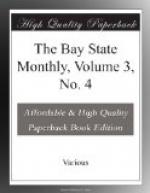field. He soon after joined the army as chaplain
and died the next year at Rutland, and his widow married
some years after the Rev. Dr. Ripley who succeeded
him in his church and home, and lived until his death
in the Manse which has always remained in the possession
of his descendants. Dr. Ripley ruled the church
and town with the iron sway of an old-fashioned New
England minister, and the old Manse has for years
been a literary centre. In the old dining room,
the solemn conclave of clergymen have cracked many
a hard doctrine and many a merry jest, seated in the
high-backed leather chairs which have stood for one
hundred and twenty years around the old table.
Here Mrs. Sarah Ripley fitted many a noted scholar
for college in the intervals of her housekeeping labors
before the open kitchen fireplace. In an attic
room, called the Saint’s chamber, from the penciled
names of honored occupants, Emerson is said to have
written
Nature, and perhaps other works, as
much of his time was spent in the Manse at various
periods of his life. Here Hawthorne came on his
wedding tour and lived for two happy years and wrote
the
Mosses from an Old Manse and other works.
In his study over the dining-room, his name is written
with a diamond on one of the little window panes, and
with the same instrument his wife has recorded on
the dining-room window annals of her daughter who
was born in the house.
[Illustration: Nathaniel Hawthorne.]
On the hill opposite, the solitary poplar, the last
of a group set out by some school-girls eighty years
ago, still stands. Each of its companions died
about the time of the decease of its lady planter,
and as the one who set out the present tree has lately
died, the poplar suffered last year from a stroke
of lightning which may cause it to follow soon.
Nearly opposite the Manse on the road toward the village
is the well preserved house, formerly the home of
Elisha Jones, which bears in the L the mark of a bullet
fired into it on the day of Concord fight. On
the same side of the way a little farther down is a
house, a portion of which was built by Humphrey Barrett
as early as 1640. As the route of the retreating
British from the bridge is followed for half a mile
down this road the common is reached, which is bounded
on the Northern end by the stores, from which the
British took flour and other Continental supplies,
and at the opposite end stands Wright tavern which
the gallant Pitcairn immortalized by stirring his
brandy with a bloody finger, unconscious that the
rebel blood he promised to stir would cause his own
to flow at Bunker Hill.




